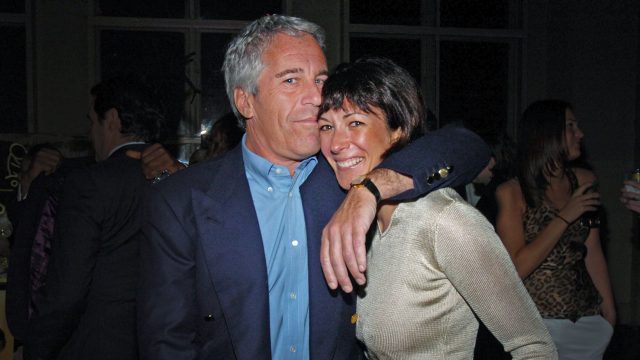She didn’t have to be here. (Photo by Joe Schildhorn/Patrick McMullan via Getty Images)

The conviction of Ghislaine Maxwell has divided feminists. I don’t know any who would suggest she is innocent. But there are those who would argue she was nothing but a handmaiden, coerced and abused by Jeffrey Epstein into luring those poor girls to be raped and prostituted. Others say she is both victim and perpetrator, and that her behaviour was a direct result of being sexually abused by her father, the late Robert Maxwell.
My take is pretty straightforward. Yes, there is evidence to suggest she was abused by her father, and it is clear that Epstein had a certain level of power and control over her. But Maxwell is a woman with immense privilege and power of her own. She was not convicted for associating with Epstein, she was convicted for procuring young women into prostitution. There is nothing of the victim about Maxwell.
She was corrupted by her own power. She wasn’t just a “daddy pleaser” who transferred her subservience to Epstein as a replacement for her father. She was an agent in her own downfall; she used her wealth and class superiority to outsource abuse. Maxwell had scant respect for her victims: during the trial, we heard how she would refer to the poor, barely educated, vulnerable young women as “scum”. It’s all grimly reminiscent of what happened during the grooming gang cases in England, where the girls were viewed as “troublesome slags” who had “chosen” a lifestyle of prostitution.
Just as in Rochdale and Rotherham, the girls served up to Epstein and his friends were mostly from disadvantaged backgrounds. Seen as “disposable”, the perpetrators knew that if the victims spoke out, it was likely they wouldn’t be believed.
Prostitution, regardless of who is procuring, drags everyone down to the same level. Epstein and Maxwells’s victims have become complicit in the abuse of other women, just as happened with the grooming gangs in the UK. Victims are encouraged to bring along other girls, which they do because they are terrified. I have interviewed so many desperate women who escaped prostitution only by recruiting others to take their places. The prostituted victim becomes the pimp. The guilt they then feel when they finally escape the sex trade is almost as traumatic as the nightmare of prostitution itself.
The truly distressing thing about all these cases, though, is how the victims are belittled, ignored and erased. All those young women who were raped are barely mentioned in press coverage nor even during the trial. And we know very little about the sheer numbers of lives Epstein and Maxwell conspired to ruin.
Reports say that Epstein demanded sex with women and girls up to three times a day. Presuming none were consensual, that could mean up to 1,068 rapes a year. It is also known that Epstein had been abusing girls for 30-40 years, which could account for over 30,000 instances of rape and sexual exploitation. We don’t know any of their names.
And naming is important, as is the language used to describe what happened to these women. We dehumanise them by using the word “trafficking”. Trafficking is merely a process used by pimps to coerce victims into the sex trade. The word obscures the grim reality of what happened. We need to call this type of abuse what it is: “child rape and prostitution”. Maxwell and Epstein, as well as the grooming gangs in the UK, were commodifying another human being for one-sided sexual gratification. It’s a human rights violation, not a transportation issue.
Taina Bien-Aimé, executive director of Coalition Against Trafficking in Women, an organisation that fights against commercial sexual exploitation, has been watching the Epstein/Maxwell case closely. “We must see the verdict as just a first step toward accountability, not a conclusion,” she says. “And remember that Epstein and Maxwell offered many of these girls as cocktail gifts to some of the most powerful men in the world, from princes to presidents, from philanthropists to politicians. Maxwell was an incredibly successful sex trafficker and the whole episode underlines how difficult it is to tackle the male demand for prostitution that fuels the global sex trade.”
She is right. A collective tolerance of the sex trade, and the acceptance of the sale and consumption of female bodies, by both the misogynistic Right and the liberal Left, lies at the heart of this problem. This is sexual abuse of the most vulnerable. But by labelling Epstein a “pedophile”, we suggest that his attraction to young girls was beyond his control, and obscure the fact that this was a massive commercial endeavour. And Ghislaine Maxwell was right beside him.
She was no coerced “handmaiden”; but she has been a useful fall guy. After Epstein killed himself, Maxwell became the sole focus of the survivors. Her conviction, though, only means that four women have been believed. What about all those other survivors? Where is their justice?
What if Maxwell were to name names? What if she were to tell law enforcers who paid Epstein for their human merchandise, no matter how powerful or well-connected these men are? That would bring all those silent women some sort of closure. It might also act as a meaningful deterrent: it might even make some men think twice before they rent a child to rape as an after-dinner treat. And surely all feminists can agree that would be a good thing.










Join the discussion
Join like minded readers that support our journalism by becoming a paid subscriber
To join the discussion in the comments, become a paid subscriber.
Join like minded readers that support our journalism, read unlimited articles and enjoy other subscriber-only benefits.
Subscribe